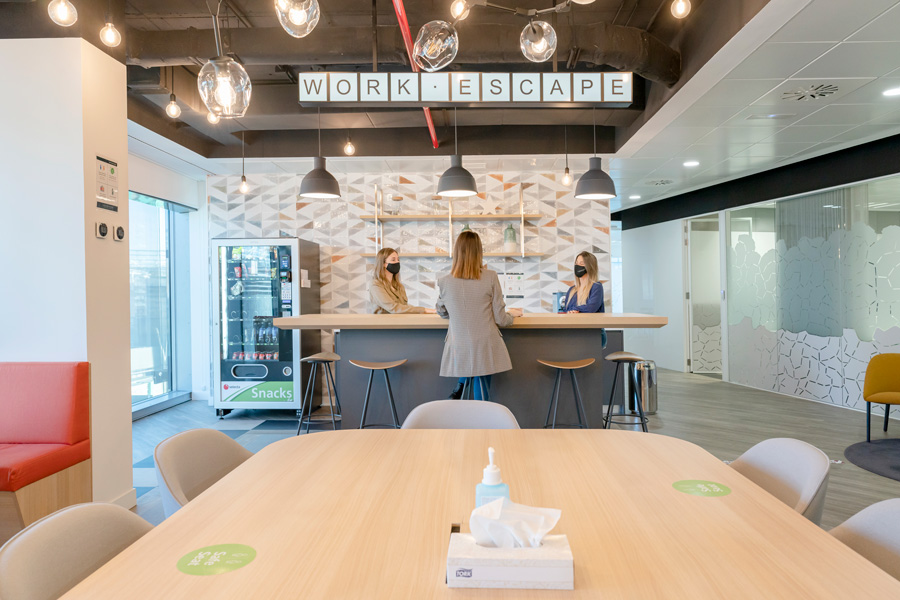In this article

What would happen if one of the most prestigious real estate consultant firms chose 10 random service companies, based in the United States and employing more than 1.6 million people altogether, to study their behaviour regarding flexible workspaces and office solutions? Easy! They would have found the perfect sample for their CBRE Agile Practice 2022. After more than 40 years working with high-profile companies and their workplace strategies, in Lexington we are positive that flexible office spaces (a global trend now) is the future, but today! This specialised report does nothing but confirm our suspicions.
Discover with us today the flexest forecast derived from this referential sample and its behaviour towards flexible office spaces.
OVERVIEW: what is the current situation, workspaces-wise?
What was only a thought all those months ago has become a reality: 100% of the companies participating as part of the sample are now working hybrid. This combination of on-site and online working (from home or what we call third spaces – sometimes, the living area out our houses is not enough to our productivity or creativity to thrive-) adds responsibility, conciliation and trust to the team, strengthening the feeling of belonging to the team and the whole company!
The question is, was their conventional office space suitable for this new mindset? In many occasions, this vintage idea of an office was extremely restrictive, becoming a burden for many companies: maybe the space size was not what the team needed anymore or it was not ready for the new ways of collaborative or remote working. That’s why 80% of the survey respondents have already decided to move to flexible workspaces, aiming to double their flexible office spaces portfolio in 2024. Salvador Aguilar, head of Agile Practice in CBRE Spain talks about flexible workspaces, adding that these workplace formulas “are no longer a temporary solution but a permanent option able to reshape according to the companies’ needs in a constantly changing market”.
This situation has made flexible office spaces a global trend, and they have come to stay! However, it is inevitable that such revolutionary way of understanding workspaces found some obstacles in the way. Many companies – maybe with wider experience, a strong feeling of property or a corporate culture they do not want to put at risk – still worry about certain factors when moving to flex. These are the most popular reasons not to move to flexible workspaces among the survey participants.
IT Security
IT managers still have reservations about cybersecurity since many flex operators were not able to develop custom-made implementations back in the day. This is no longer an issue, but the stigma remains.
Is there a way Lexington could fix this?
Our experience on the field is pretty extensive. In Lexington, we meet the biggest and most complex companies’ expectations on IT and technological requests.
Availability
Finding the perfect match is no piece of cake. Even though flexible workspaces have the whole lot to cover all your needs, timing is everything. Availability is another issue companies face moving to flex.
Is there a way to avoid this?
Following professional advice, working hybrid and opening your mind to different space combinations (private + on demand formulas such as meeting rooms or access passes like our Day Pass and Office Pass) until that perfect space becomes available could be the perfect solution to get comfortable little by little.
Cultural fit
Another big concern, far from baseless, is cultural fit and how to maintain a business’ corporate culture in a space with its own personality. Many team managers were afraid of their workforce losing the sense of belonging.
Solution? There you go!
Don’t you worry, child! Flexible workspaces operators whose expertise lies on high-profile corporate companies, as ours does in Lexington, had that in mind even before you started worrying about it! We offer complete dedicated spaces, able to breathe your company’s branding and personality. Interior design and decorations, private meeting rooms answering to your own way of working… even corporate buildings located wherever your company decides, 100% managed by Lexington!
Corporate’s favourite cocktail
The real estate consultant CBRE includes high-profile companies’ behaviour regarding its choice of workspaces in its report, because one size does not fit all!
Enterprise Spaces + Suites
There is something all companies participating have in common regarding flexible workspaces, and that is their preference towards Enterprise Spaces: private office spaces or whole office floors for a single company, with personalised amenities for each team, workstations and meeting points, branding… besides access to the rest of common spaces and meeting rooms to book by the hour, kitchen areas, coffee points and whatnot.
In many occasions, growth perspectives request more and more space, but now a whole floor, so that’s why 70% of the corporate companies based in a corporate coworking 😉 combine these Enterprise Spaces with what we know as Suites: office spaces in Madrid or private workspaces in Barcelona within a shared floor and with access to all the common areas, amenities and resources in general.
Enterprise Spaces + On Demand
big corporations are also going for On Demand formulas to combine with their private flexible office space. This type of workspaces comprises meeting and event rooms. And shared workspaces to book by the hour. Such temporary solutions are able to meet one-time request within a professional environment, allowing teams to feel close to one another when meeting rooms are all booked, desks all occupied or when an unexpected visit shows up. These pay-per-use are the perfect solution in the short-run and the best indicator to know that it is time to rethink the workplace strategy and grow.
Enterprise Spaces + Access Pass
Nevertheless, not all flexible solutions are suitable for big corporations (they are not among their favourites, at least). Access Passes or monthly subscriptions lack popularity among workplace managers, just because companies prefer having a private office space they can book for a month or half a year rather than getting a subscription to a hot desk area.
You may be interested
Drivers for flexible decisions
Undoubtedly, “we are witness of the greatest development in flexible workspaces requests nowadays”, as speaks Salvador Aguilar, head of Agile Practice in CBRE Spain. “Start-ups and freelancers are no longer the only professionals turning to flexible workspaces, but big corporations too, using these new formulas to attract employees back to the office”. Both companies and teams are very sure of their positions towards flex offices, so much that common decision drivers are worth mentioning in this 2022 report.
While companies of all sizes (yes, no matter how big or small your company is, you need flexible workspaces for your business to thrive) arrive to flex because of how much money they are saving and how malleable office spaces are, teams stay because they and their wellbeing are now the centre of the whole strategy.
Business with growing workforces are now usual customers of these flexible office formulas, both permanently or temporarily, to explore new markets or properly landing a growth strategies. Working environments such as these are perfect for remote co-workers, collaborative teams or to test new ways of working during uncertain or challenging times for the company.
Flexible office spaces in Lexington
Lexington’s expertise lies on corporate’s workspaces requests (in fact, CBRE’s might as well be tailor-made for us!), with high expectations and teams working worldwide. Flexible office spaces, able to adapt to each business pace and to keep up with their growth rates, while providing an accessible space for both the team and the brand to get inspired.
In the words of David Vega, Lexington CEO: “Flexible office spaces are no longer a temporary solution, an environment to stop by, but the option that completes workplace strategies for companies of all sizes. Cost optimisation, strategic locations, facilities designed for team’s wellbeing and cutting-edge technology are only a few of the main characteristics that define the present (and future) of workspaces. A horizon that looks flexible, no doubt”.


